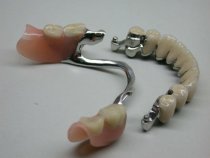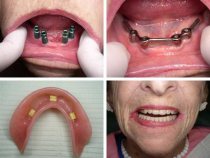Types of Dental Prostheses

A dental prosthesis is a dental appliance that replaces a missing tooth or covers up tooth defects. These dental appliances include implants, crowns, bridges, dentures and veneers, and some of them can be removable or permanently fixed in your mouth. If you think you might benefit from a prosthesis, your dentist or prosthodontist can explain the most effective option for your dental needs.
Types of Dental Prostheses:
The range of dental prostheses can seem overwhelming, but it is easy to differentiate the devices once you learn what each one does. Check out these four types of prostheses:
- Dental implants. With implants, the clue is in the name. Dental implants are implanted into the bone of the jaw like the root of a tooth and can replace one, several or entire rows of teeth.
- Crowns. Crowns cover a single damaged tooth or form part of a bridge, where the crowns are placed on each side of one or more false teeth.

- Dentures. Dentures are partial and replace a few false teeth or full and replace rows of false teeth.
- Veneers. Veneers are thin shells that cover discolored or chipped teeth to improve their appearance.
Which Dental Prosthesis Is Right For You?
The number of missing teeth, the condition of the remaining teeth and the thickness of the jawbone are some considerations your dentist or prosthodontist will take into account before making a recommendation for a dental prosthesis. If only one or two teeth are missing and the remaining teeth are healthy, a bridge or partial denture could be an effective solution. When few natural teeth remain and they're in bad condition, dentures or implants might be the best option. However, if the jawbone is thin, your dentist may have to graft additional bone into the area to support the implant fixture (this is the titanium post that is placed into the bone).
Your dentist can offer the best advice regarding which dental prosthesis suits your needs, but some factors to keep in mind include cost, appearance and length of treatment. Implants offer a very natural-looking replacement for missing teeth. However, an implant can cost several thousand dollars and treatment may take up to six months.
To replace one or a few missing teeth, a bridge is usually a less expensive choice and the treatment typically only requires two visits to the dentist. Dentures may be an affordable option, but you must wait several months for your mouth to heal and adjust before it's ready for your permanent denture. For veneers, you can choose between porcelain and composite resin veneers. Porcelain veneers are often more expensive than composite resin veneers and will last between 10 and 20 years.
How Are Dental Prostheses Made?
To make a dental prosthesis, your dentist will conduct a thorough assessment of your teeth and oral cavity and take dental X-rays of the teeth involved for the dental prosthesis. This allows your dentist to provide a prosthesis that supports any remaining teeth, lets you eat and speak normally and looks great. In the next step, the dentist usually takes an impression of the existing teeth by asking you to bite into a mold. Then they send the mold to the dental laboratory. According to Decisions in Dentistry, dental prostheses can be made from a range of materials, including porcelain, composite resin, acrylic and zirconia.
After the device is made, the placement procedure depends on which dental prosthesis you're receiving. To fit implants, your dentist must surgically insert a titanium fixture (post) into your bone, and then you must wait several months before getting the prosthetic placed to make sure the implant is properly placed and secured into the bone. If you're receiving a crown, bridge or veneers, your dentist may remove or etch part of the tooth surface to prepare it for the prosthesis. Dentures need to be checked to ensure they fit snugly and comfortably in your mouth.
Dental prostheses can help patients feel more confident by replacing missing teeth or by making discolored or damaged teeth look more attractive. If you think a prosthesis might be the solution to your dental problem, make an appointment with your dentist or prosthodontist to discuss your options for improving your smile.